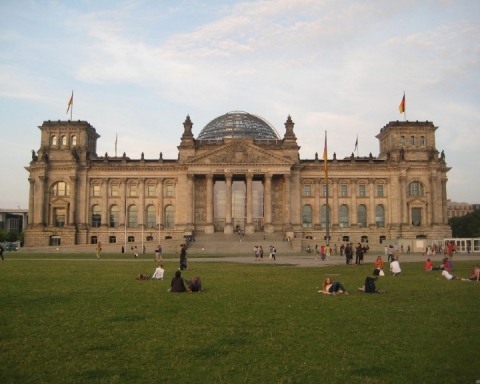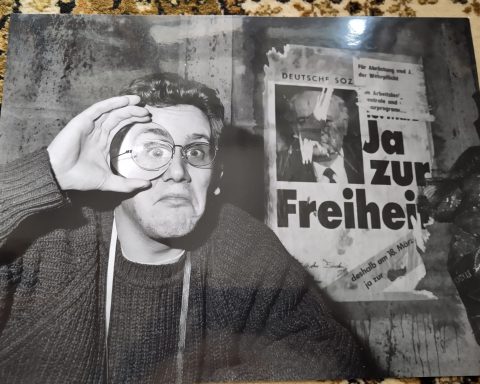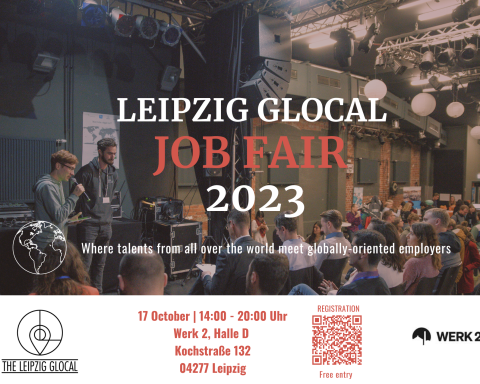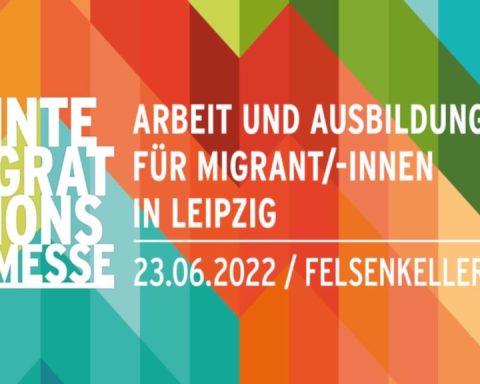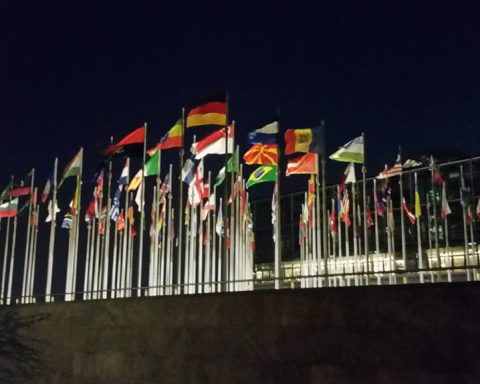Hermann Winkler (CDU) is a Member of the European Parliament (MEP) and is running for re-election. This interview with him is part of our series on the City Council and European Parliament elections of 26 May 2019. We invited all Leipzig candidates of all major parties (CDU, SPD, Grünen, Die Linke, FDP and AfD) to answer the questions below. Our aim is for our audience to get to meet the candidates and know their political stances better. All questions and answers are provided in German and English. The answers to the questions and any other opinions provided by them are the candidates’ own.
Hermann Winkler (CDU) ist Mitglied des Europäischen Parlaments (MEP) und kandidiert für die nächste europäische Legislaturperiode. Dieses Interview mit ihm ist Teil unserer Reihe über die Stadtrats- und Europawahlen am 26. Mai 2019. Wir haben alle Leipziger Kandidat_innen aller großen Parteien (CDU, SPD, Grüne, Die Linke, FDP und AfD) eingeladen, die folgenden Fragen zu beantworten. Unser Ziel ist, dass unser Publikum die Kandidat_innen und ihre politischen Meinungen besser kennenlernt. Alle Fragen und Antworten zeigen wir in deutscher und englischer Sprache. Die Antworten auf die Fragen und alle anderen von ihnen ausgedrückten Standpunkte sind allein die der Kandidaten.

Viele Menschen stellen sich das Europäische Parlament und andere Glieder der EU als abstrakte und unnahbare Institutionen vor, die gar keinen Einfluss auf lokaler Ebene, z.B. in Leipzig, haben. Teilen Sie diese Meinung?
Many people imagine the European Parliament and other parts of the EU as abstract and distant institutions that have no influence at all at the local level, for example in Leipzig. Do you share this opinion?
Deutsch: Ich kann verstehen, warum viele Bürgerinnen und Bürger so denken. Und da liegt auch ein großer Nachholbedarf, denn die Europäische Union ist gar nicht so abstrakt und entfernt von allem. Viele deutsche Gesetze lassen sich auf europäische Richtlinien zurückführen.
Ein großer und wichtiger Punkt sind auch die Strukturfonds, welche die EU zur Verfügung stellt. Diese kommen direkt den Regionen zugute. Viele Projekte und Entwicklungen in Leipzig und im Freistaat hätten sonst nicht realisiert werden können, zum Beispiel der Leipziger City-Tunnel.
English: I can understand why many citizens think like that. And there’s a lot of catching up to do, because the European Union isn’t so abstract and distant from everything. Many German laws can be traced back to European directives.
Another large and important point is the Structural Funds provided by the EU. They directly benefit local regions. Many projects and developments in Leipzig and the State of Saxony would otherwise not have been possible, for example Leipzig’s City Tunnel.

Nationalistische und populistische Parteien haben in Europa großen Zulauf. Was sollte man Ihrer Meinung nach auf europäischer Ebene tun, um die populistische Welle zu stoppen und die liberale Demokratie zu schützen?
Nationalist and populist parties are very popular in Europe. What do you think should be done at the European level to stop the populist wave and protect liberal democracy?
Deutsch: Es ist richtig, dass der Populismus in Europa salonfähig zu werden scheint. Zur Wahrheit gehört aber auch, dass auch und gerade bei der Europäischen Union häufig nicht zugehört wurde, wenn es um Kritik ging. Wir müssen zeigen, dass die Europäische Union ein gutes und erhaltenswertes Projekt ist, welches aber auch auf aktuelle Entwicklungen eingehen muss.
Wichtig ist dabei, dass die EU sich in ihren Aufgaben beschränkt und eben nicht versucht, alles im „Klein-Klein“ regeln zu wollen. Damit würde auch das Vertrauen in der Bevölkerung gestärkt, welches notwendig ist, um die EU zu erhalten.
English: It’s true that populism seems to become generally acceptable in Europe. However, it’s also part of the truth that even, and especially, people at the European Union often didn’t listen when it came to criticism. We must show that the European Union is a good project worth preserving, but one that must also take current developments into account.
What’s important here is for the EU itself to limit its tasks and not to try to regulate everything in the minutest details. This would also strengthen the population’s trust, which is necessary to preserve the EU.
Nach den Ereignissen in Chemnitz letztes Jahr ist der Ruf Sachsens vor allem in Bezug auf seine Weltoffenheit für viele Leipziger, Deutsche und Menschen in anderen Ländern schlechter geworden. Was werden Sie tun, um Sachsens Ruf in dieser Hinsicht zu verbessern?
After the events in Chemnitz last year, Saxony’s reputation has deteriorated for many Leipzigers, Germans and people in other countries, regarding especially its openness to the world. What will you do to improve Saxony’s reputation in this respect?
Deutsch: Sachsen und insbesondere Chemnitz waren in letzter Zeit medial leider viel zu häufig präsent. Dies entspricht nicht meinem Bild von Sachsen und Chemnitz und auch nicht der Wirklichkeit. Wir müssen einfach zusammen jeden Tag in unserem Handeln zeigen, dass wir besser sind, als es die mediale Darstellung suggeriert.
English: Lately, Saxony and particularly Chemnitz have unfortunately been present in the media much too frequently. This doesn’t correspond to my image of Saxony and Chemnitz, and not to reality either. We simply have to show together, everyday in our actions, that we are better than media coverage suggests.

Sollte Europa eine gemeinsame Migrationspolitik haben? Wie sollte sie aussehen?
Should Europe have a common migration policy? What should it look like?
Deutsch: Meiner Meinung nach sollte eine gemeinsame Migrationspolitik eine der Hauptaufgaben sein, auf welche die EU sich besinnen sollte. Hierbei muss es vor allem darum gehen, dass nicht bestimmte EU-Mitgliedsstaaten den Großteil an Flüchtenden und Asylbewerbern aufnehmen, während andere EU-Länder daran kein Interesse haben. Die EU basiert auf Solidarität, und das muss auch bei der Migrationspolitik gelten.
English: In my opinion, a common migration policy should be one of the main tasks on which the EU should concentrate. Here, it’s especially important that not [only] certain EU member states receive the majority of refugees and asylum seekers, while other EU countries have no interest in that. The EU is based on solidarity, and this must apply also to migration policy.
Teilen Sie die Meinung Präsident Macrons, dass die EU gefährdet ist wie nie zuvor? Und wie sollten EU-Institutionen auf den Brexit reagieren?
Do you share President Macron’s opinion that the EU is in greater danger than ever before? And how should EU institutions react to Brexit?
Deutsch: Der Brexit ist aktuell wohl die größte Herausforderung für die EU. Im Moment geht es nur noch um Schadensbegrenzung. Es birgt natürlich die Gefahr, dass nun nach Großbritannien weitere Mitgliedsstaaten sich abwenden wollen und die EU verlassen. Hier müssen wir alle an einem Strang ziehen, um zu zeigen, dass die EU auch weiterhin als vielseitiges Friedensprojekt funktionieren kann und wird.
English: Brexit may currently be the greatest challenge for the EU. At the moment, we can no longer do more than contain the damage. There’s of course the danger that now, after Britain, other member states will want to turn away and leave the EU. Here, we must all pull together to show that the EU can and will continue to function as a versatile peace project.

Klimawandel trifft jeden. Können Sie kurz erläutern, was Ihre Meinung zur aktuellen Klimapolitik ist? Was kann im Europäischen Parlament getan werden, um die Auswirkungen des Klimawandels zu verringern?
Climate change affects everyone. Can you briefly explain what your opinion is on current climate policy? What can be done in the European Parliament to reduce the impact of climate change?
Deutsch: Vor kurzem haben wir im Europäischen Parlament darüber abgestimmt, ob z.B. Plastikstrohhalme verboten werden sollten. Die Reduktion von Plastik ist ein erster Schritt, um beispielsweise die Plastikfluten in den Weltmeeren zu reduzieren. Viel kann auch jeder persönlich tun und es bedarf nicht zwingend gesetzlicher Maßnahmen. Ein jeder sollte darauf achten, wie er mit der Umwelt umgeht. Mit mehr Investitionen in innovative und ressourcensparende Ideen können wir sicherlich viel bewegen.
English: We recently voted in the European Parliament on whether plastic straws, for example, should be banned. The reduction of plastic is a first step towards reducing plastic floods in the oceans, for example. Much can also be done by everyone personally, and there’s no automatic need for legislative measures. Everyone should pay attention to how they treat the environment. We can certainly make a difference by investing more in innovative and resource-saving ideas.
Wie sehen Sie Leipzig und Europa im Jahr 2040?
How do you see Leipzig and Europe in 2040?
Deutsch: Ich wünsche mir, dass wir auch 2040 in einem wachsenden Leipzig leben und den europäischen Gedanken auch weiterhin fortführen.
English: I hope that also in 2040, we live in a growing Leipzig and continue the European idea.


